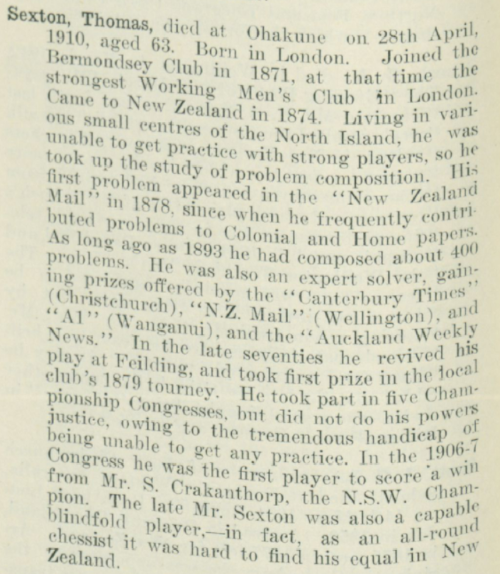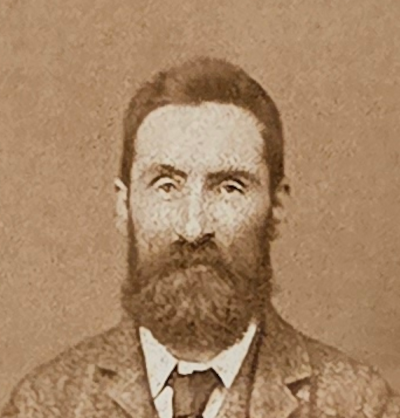Thomas Sexton
Chess Obituary: OTAGO WITNESS, ISSUE 2932, 25 MAY 1910, PAGE 71
Sexton, T. (Blindfold) vs. Sexton E., Feilding 1888 [d]
ECO "C50" Italian Game
Annotator " "
1. e4 e5 2. Nf3 Nc6 3. Bc4 d6 {Inferior to 3... Bc5 or 3... Nf6 as it confines the KB and generally cramps his game.} 4. c3 Na5 5. b3 Be7 6. d4 Nxc4 7. bxc4 exd4 {7... Bg4 would have been more to the purpose. The line of play adopted gives White a strong centre of pawns.} 8. cxd4 Bf6 9. Bb2 Qd7 10. Nc3 Ne7 {Black conducts the defence in a very weak and irregular manner, and as a necessary consequence ho soon places himself in a most unenviable position.} 11. O-O c6 12. Re1 O-O 13. Qd3 {If White on this or the two preceding moves 13. e5, he must have gained the Bishop and with it the game.} 13... Ng6 14. d5 Nf4 15. Qe3 g5 16. e5 dxe5 17. Nxe5 Bxe5 18. Qxe5 f6 {He might have gained an advantage here by 18... Nd3.} 19. Qe4 Qg4 20. g3 Nh3+ {White has been gradually drifting to leeward, and at this point his opponent could have practically forced the game in the following manner: 20... Bf5 21. Qh1 (21. Qe3 Rae8 22. Qxe8 Rxe8 23. Rxe8+ Kf7 24. Rae1 Qf3 25. R1e7+ Kg6 26. Rg8+ Kh6 27. gxf4 Bh3 28. fxg5+ fxg5 and wins) 21... Nd3 22. Re2 Ne5 23. Re3 Nxc4 24. Re2 Bd3 with a palpable advantage.} 21. Kg2 Bf5 22. Qxg4 Bxg4 23. f3 Bf5 24. g4 Nf4+ 25. Kg3 Bg6 26. Rad1 Nd3 27. Ba3 Rfe8 28. Rxe8+ Rxe8 29. d6 Rd8 30. Ne2 c5 31. f4 Rxd6 32. Bxc5 Rd7 {Once more Black fails to take advantage of his position. He had simply to capture 32...Nxc5 and the day was his open.} 33. Bxa7 Rc7 {This brings the game to a speedy conclusion.} 34. f5 Nb2 35. Rd8+ Kg7 36. fxg6 Kxg6 37. c5 Na4 38. Nd4 Nc3 39. Nf5 Nxa2 40. Rg8+ Kf7 41. Rg7+ Ke6 42. Rxc7 {and Black resigns.} 1-0
{Considering the complicated nature of the game White deserves great credit for the generally correct way in which he has conducted it.}
Feilding Star 31 January 1884
Mr T. Sexton, of Makino, was second in the Canterbury Chess Problem Tournament. There were 65 entries.
Sexton, J. vs. Sexton, T., Sanson 1889 [e]
ECO "C56" Two Knights Defence
1. e4 e5 2. Nf3 Nc6 3. Bc4 Nf6 4. d4 {Not so frequently adopted as 4. Ng5 it is, however, a pleasant variation of the attack.} 4... exd4 5. Nxd4 {5. O-O or 5. e5 are the more usual continuations.} 5... Bc5 6. Be3 Nxe4 7. Qf3 d5 8. Nxc6 bxc6 9. Bxc5 Nxc5 10. Qe3+ Ne6 {10...Qe7 would also have been a satisfatory defence, and would left Black with some good lines of play at his disposal.} 11. Bb3 Ba6 12. Nc3 O-O 13. O-O-O Qf6 {The game is now well opened on both sides, and has an interesting look about it.} 14. Ne2 Rfb8 {14... Rfe8 would have been very powerful. This massing of force of force on the Queen's wing results in nothing.} 15. Rd2 Rb6 16. c3 Rab8 17. Re1 Bc8 18. Nf4 {Ingenious, as it is clear that Black cannot take the knight with either piece.} 18... a5 {He had far better have moved 18... Bd7.} 19. Bxd5 {Spiritedly followed up and leading to an exceedingly pretty termination.} 19... cxd5 20. Nxd5 Qh4 21. g3 Qa4 22. Nxb6 cxb6 23. Rd8+ Nf8 24. {and White mates in four moves.} 1-0
New Zealand Herald 23 September 1893
n Saturday evening, September 2, in the Foresters' Hall, Asimrst, Mr. T. Sexton pl ived blindfold the six players who are left in the final of the chess tournament, viz., Messrs. K. Gallichan, A. Gallichan, W, S. Maunder. G. Hart, J. S. Freeman, and Rimmer. The two latter players being unable to be present, their places were taken by F. Sanders and A. Reeve. A number of spectators evinced the greatest interest in the games, which progressed with unabated spirit until a late hour, the result of the six games being that Messrs. K. and A. Gallichan and F. Sanders won, and G. Hart, W. S. Maunder, and A..Reeve lost. Mr. Sexton may be congratulated on this feat, which, as regards the number of panics played simultaneously blindfold, has, we believe, beaten the record in New Zealand.
New Zealand Herald 16 June 1894
annual meeting of the Ashurst Club
vice-presidents, Messrs. T. Sexton
A friendly match of seven wins, draws to count, is now in progress between Mr Thomas Sexton, of Woodville, and Mr H. Godtschalk, of Pahiatua. The score at present stands 31/2 and 11/2 wins respectively. [f]
Sexton, T. vs. Godtschalk, H., 1st Match Game, 1895 [f]
ECO "C54" Giuoco Piano
Annotator "Benbow, C. W."
1. e4 e5 2. Nf3 Nc6 3. Bc4 Bc5 4. c3 Nf6 5. b4 {An interesting form of the opening, but one not very frequently met with.} 5... Bb6 {If 5... Ng4 6. O-O d6 7. d3 etc.} 6. d3 O-O 7. Nbd2 d6 {7... a5 would have been a good attacking move.} 8. Bb3 Ne7 9. Nc4 Nd7 {This does not seem to be making the best of matters. 9... Bg4 or 9... Ng6 strikes us as being more to the purpose.} 10. Nxb6 {Somewhat precipitate. Why not 10. Bb2 at once?} 10... Nxb6 11. Bb2 Qe8 12. Rc1 Nd7 13. d4 Ng6 14. Ng5 Nf6 {This knight has travelled a good deal, but to little effect.} 15. O-O b6 16. Re1 Bb7 17. d5 Bc8 18. h3 Qd7 {Black doubtless had a reason for this move, but it is difficult to discover what it could have been. One thing, however, is clear, and that is that the move blocks in the Bishop worse than it was before.} 19. c4 a6 20. c5 h6 21. cxd6 {This appears to be sound enough, and it adds interest to the game.} 21... hxg5 22. dxc7 g4 23. Re3 Nf4 24. Bxe5 Nxh3+ 25. gxh3 Qe7 26. Bxf6 Qxf6 27. hxg4 Qf4 28. Rg3 Re8 29. Rc6 Rxe4 30. d6 Rd4 31. Bxf7+ {The play has been lively for some little time past, and this move improves White's prospects very materially, though in any case he had the best of the game.} 31... Kxf7 32. Qb3+ Ke8 {Had he moved Be6 the continuation would have been 33. Rf3 Bxb3 34. Rxf4+ Rxf4 35. d7+ and wins.} 33. d7+ Bxd7 34. Qg8+ Ke7 35. Qxg7+ Qf7 36. Re3+ Be6 37. Rexe6+ {Resigns.} 1-0
Chess in Woodville.
The score stands— Mr Gottsch.dk 1J win", Mr Sexton 3.
Gottschalk, H. vs. Sexton, T., 4th Match Game game, Woodville, 1895 [g]
ECO "D00" Stonewall Attack
1. d4 d5 2. e3 Nf6 3. Bd3 e6 4. Nd2 c5 5. c3 Nc6 6. f4 Bd6 7. Ngf3 Qc7 {Much on the usual lines Mason says :— "The differences of position upon which analytical verdicts regarding the close openings rest are obscure even to the verge of practical nouexistence."} 8. Ne5 cxd4 9. exd4 b6 10. O-O Bb7 11. Ndf3 Ne4 12. Nxc6 {12 Bxe4 seems a strong move here, as after 13. Ng5, White should win at least a pawn.} 12... Bxc6 13. Ne5 Bb7 {Black is now obliged to forego castling. He no doubt desired to retain both B's.} 14. Bb5+ Ke7 15. Qg4 g6 16. Qh4+ f6 17. Be3 Rag8 18. Rf3 h6 19. Rc1 {A weak move at a critical point.} 19... a6 20. Bd3 g5 21. fxg5 {Not good Sexton points out that the proper move was Qh5. The Kt could not be taken with advantage. At his 18th move White could have played Qh6 with good prospects. The Kt could not be taken unless at the cost of the B, which has no escape. The K must retire to make room for the B. If 21...fxe5 22. fxe5 Bxe5 23. dxe5 Qxe5 24. Bd4 wins the exchange with a formidable attack.} 21... hxg5 22. Ng6+ Kd8 23. Qxh8 {He should have retired the Q at all hazards, but as be must lose the Kt the game is now lost for White.} 23... Rxh8 24. Nxh8 Qh7? 25. Rh3 Qg7 26. Bxe4 dxe4 27. Rf1 Bf4 28. Bxf4 gxf4 29. Rxf4 e3 30. Rg3 Qxh8 31. Rxe3 Qh6 32. g3 Bd5 33. b3 b5 34. Re2 Qg6 35. Ref2 {It was hopeless to continue the game. The middle game is very interesting. At bis 38th move Black has only one move to escape mate - namely, the one he makes.} 35... Qb1+ 36. Rf1 Qxa2 37. R4f2 Qxb3 38. Rxf6 Qxc3 39. Rf8+ Kc7 40. R8f4 b4 41. {Resigns.} 0-1
THE AUSTRALIAN CHESS ANNUAL, 1896 (Article by J. C. Andersen)
Mr. Thomas Sexton. — Joined the Bermondsey Club in 1871 at that time the strongest working men's club in London. Unfitted by lack of practice for many years from coping with strong players, was fortunately induced io take up the study of problem composition, his first problem appearing in the New Zealand Mail in 1878, since when he has constantly published problems in the Colonial and Home papers. At the establisment of the Country Club in tne Fielding Block in 1877, however, Mr. Sexton revived his play, and he has competed in four of the New Zealand championship congresses. Stands best as a blindfold player. Played his l^rst blindfold game in 1880, and has played as many as six at a sitting. Mr. Sexton competed in the first solving tourney in New Zealand, instituted by the Canterbury Times, where he won second prize, Mr. Benbow winning first. He also took second prize in the New Zealand Mail, solving tourney in 1892, tied for first prize in the "Al " tourney 1895, and took first prize for the " Al " tourney of 1896, all for solving.
Book of the 30th & 31st Congresses - Obituary

NZ Chess Championships Results
-----------------------------------------------------------------------------------------------------------------------------------------------
References:
[1] Geni - Thomas Sexton (geni.com)
[d] New Zealand Mail 17 April 1880
[e] New Zealand Mail 12 July 1889
[f] New Zealand Mail 26 April 1895
[g] Otago Witness 9 May 1895
